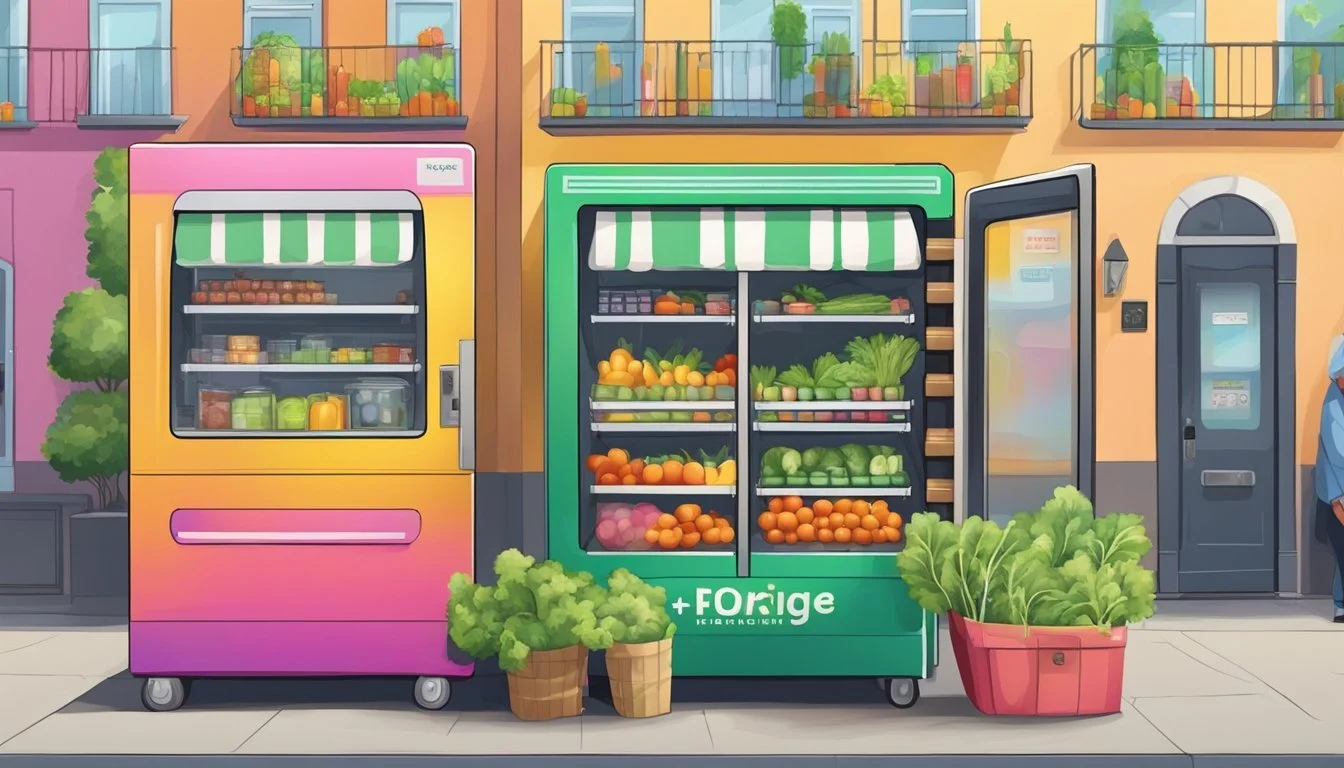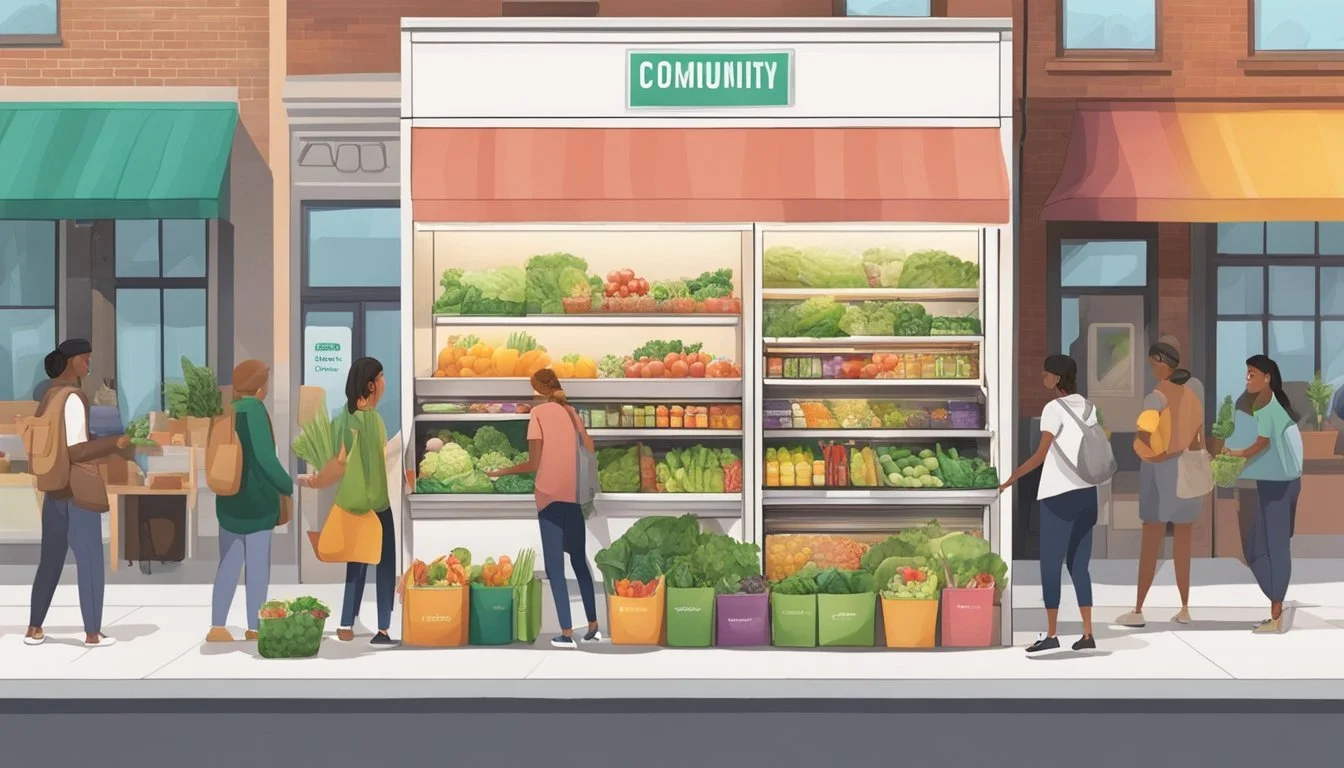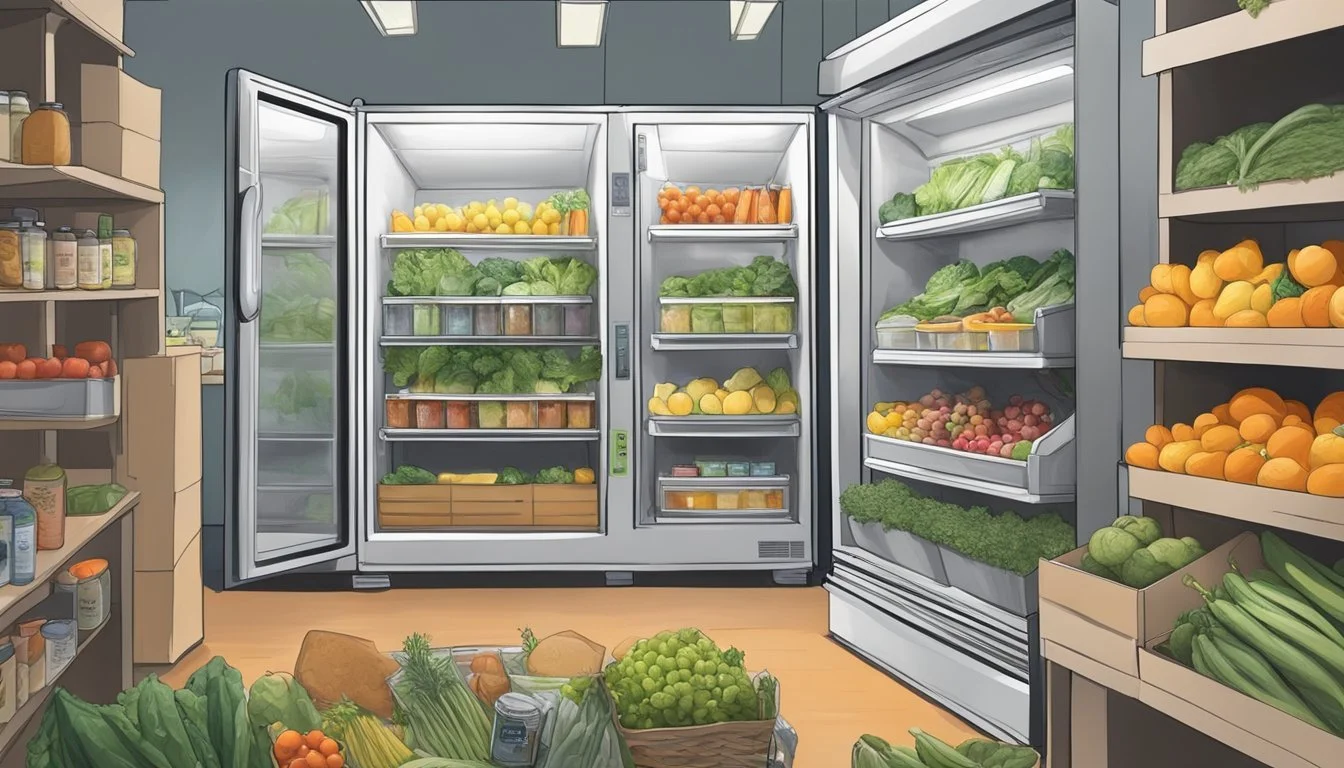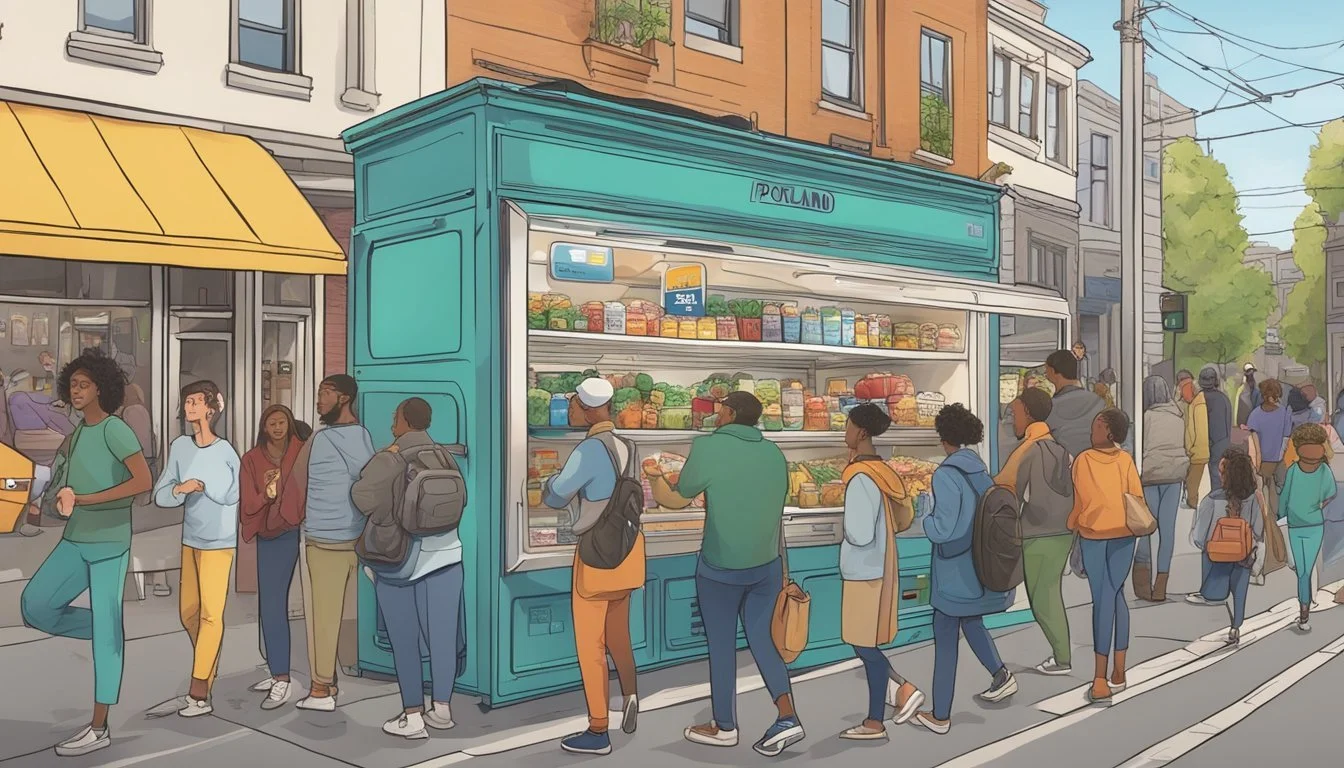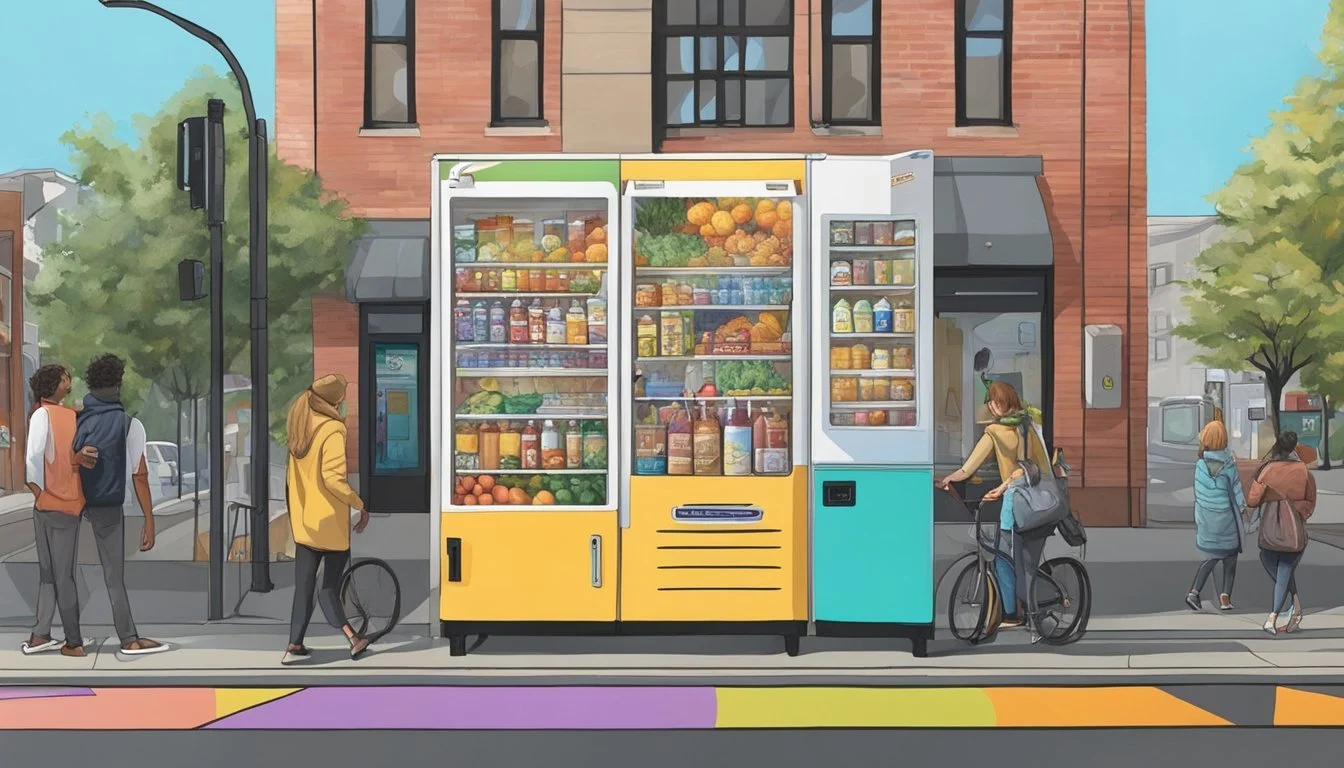Portland, OR Community Fridge
Bridging the Nutrition Gap with Compassion
Community fridges have emerged as a novel approach to food insecurity and waste reduction, gaining momentum in cities like Portland, Oregon. These refrigerators, which are publicly accessible, operate on the principle of mutual aid, where people can leave and take food items freely. This effort is rooted in community support and relies on a network of volunteers and donors. The concept empowers residents by providing direct access to fresh food and supplies, thereby fostering a sense of communal responsibility and support.
In Portland, the PDX Free Fridge program exemplifies this initiative, creating a sprawling network that spans the entire city. These fridges and accompanying pantries are installed in neighborhoods, accessible to all, and seek to alleviate hunger while also creating a platform for community engagement and solidarity. They are maintained by community members, who ensure these resources are stocked with vital supplies, reflecting a ground-up approach to addressing societal challenges.
Community-based efforts like the Portland Community Fridge underline the potential for grassroots movements to effectuate tangible change. By emphasizing community-informed solutions, they strive to enhance the quality of life for residents while also reducing food waste through shared responsibility. It is through these localized efforts that communities like Portland exhibit resilience and adaptability in the face of socioeconomic adversities.
History of Community Fridges in Portland
Community fridges in Portland have become vital resources for food security, emerging as a community-based response to growing needs, particularly during challenging times such as the pandemic.
Origins of the PDX Free Fridge Program
The PDX Free Fridge Program was birthed from a community effort to address food insecurity in Portland, Oregon. It leverages a network of independent fridges and pantries aimed at redistributing existing resources to provide free food and supplies. The initiative found inspiration in similar projects in cities like New York and rapidly adapted to the local context of Portland, reflecting a grassroots approach to mutual aid.
Growth During the Pandemic
With the onslaught of the pandemic, the need for community support systems like the PDX Free Fridge became more acute. Food insecurity rates rose, and the community fridges turned into essential assets in Portland neighborhoods. They expanded from a single fridge to an impressive network supporting numerous locals. The growth during the pandemic underscored the program's relevance and the community's resilience in the face of adversity, with fridges accessible 24/7 and maintained by diligent volunteers.
How Community Fridges Work
Community fridges in Portland operate as part of a mutual aid network, providing free access to food and vital supplies. They are maintained round-the-clock by volunteers who ensure their operations adhere to strict safety and sanitation protocols.
Operations of a Community Fridge
Community fridges are usually installed in accessible locations across Portland, allowing anyone to take what they need or leave donations. The essence of a community fridge is to operate on the principles of trust and need, supported by the contributions and use of community members. Fridges are restocked through donations from individuals, businesses, and other entities. The contents of a community refrigerator are typically perishable and non-perishable food items along with vital supplies.
Access: 24/7 availability to the public
Stock: Managed by community donations
Safety and Sanitation Guidelines
Strict guidelines ensure the safety and cleanliness of the community fridges. A team of volunteers regularly checks the items for spoilage or contamination and conducts routine cleaning sessions. Community guidelines are publicly posted near each fridge outlining what can and cannot be donated, ensuring the health and safety of all users.
Inspections: Daily checks for unsafe items
Sanitation: Regular cleaning and sanitizing
Safety guidelines generally include:
Acceptable items: Packaged and labeled food, fresh produce, non-perishable goods
Prohibited items: Alcohol, opened packages, homemade meals, expired food
Regular oversight by the volunteers and adherence to these guidelines are crucial to maintaining the integrity and reliability of the community fridge initiative.
Getting Involved
Engaging with Portland's community fridges offers a range of possibilities from volunteering to donating goods. Each individual's contribution strengthens the network's ability to provide for those in need.
Volunteering Opportunities
Individuals wishing to volunteer can contribute by taking part in various activities. These could include:
Stocking Fridges: Ensuring fridges are well-stocked with fresh food.
Cleaning: Maintaining cleanliness standards for safety and hygiene.
Outreach: Spreading the word to increase community engagement and involvement.
Prospective volunteers can reach out to local community fridge organizers to find out specific needs and schedules.
Donating Goods
Donations are the backbone of the community fridge system. The following items are typically accepted:
Fresh produce
Packaged foods with a clearly labeled expiration date
Non-perishable items like canned goods or dry pasta
Donors are encouraged to ensure that all food contributions are safe to consume and within their expiration dates.
Organizing a Community Fridge
Starting a community fridge involves the following steps:
Identifying a Location: A fridge should be easily accessible and in an area serving those in need.
Securing Supplies: This includes a refrigerator, pantry shelving, and initial food supplies.
Gathering a Team: Organizers will need a team of dedicated volunteers for ongoing support.
Interested parties should contact existing community fridge initiatives to gain insights and best practices for setting up a new location.
Impact on Food Insecurity
Portland, Oregon, has taken innovative steps to combat food insecurity, a persistent challenge in urban settings. Community fridges serve as a grassroots response to hunger by providing free food to those in need. These refrigerators are strategically placed in front of homes and local businesses allowing people to take what they require and contribute when possible.
Community fridges in Portland make a measurable dent in food scarcity by operating on a simple yet effective principle of sharing. Food items are stocked and run by volunteers, highlighting a community-centered approach to food insecurity. In neighborhoods across the city, residents experience direct access to free, nutritious food, mitigating the immediate effects of hunger.
Accessibility: available to anyone without restriction
Frequency of donation: Regular contributions from community members
Content variety: Fruits, vegetables, pantry staples, and prepared meals
Such programs play a crucial role in fostering communal support and reducing the stigma associated with seeking help. By enabling anonymous access to food, these fridges uphold the dignity of those they serve. Moreover, they act as a stepping stone towards sustaining food justice, an integral part of the city's social support ecosystem.
While this does not solve food insecurity entirely, the Portland community fridge initiative markedly improves the circumstances for many residents. They are vital in ensuring that fewer people are left without access to food on any given day. Community fridges stand not only as a source of sustenance but also as a beacon of community solidarity in the fight against hunger in Portland.
The Role of Social Media
In Portland's community fridge initiatives, social media serves as a pivotal tool for both the dissemination of information and the mobilization of community participation. Platforms like Instagram become critical in reaching a wide audience.
Promotion of Free Fridges
Instagram and other social media platforms are instrumental in promoting Portland's community fridges. They share visuals and details of fridge locations to ensure residents are aware of these resources. Posts often include:
Photos of the fridges and their contents
Updates on restocking
Volunteers in action
Urgent needs and donation requests
This use of social media helps to maintain and broadcast the project's presence, facilitating easy access for those in need of food or willing to donate.
Engaging the Community
Through social media, organizers of Portland's community fridge program actively engage with the local community. They create posts that encourage community members to contribute and maintain the fridges. Engagement strategies include:
Highlighting stories of volunteers and beneficiaries
Sharing impact statistics and gratitude posts
Organizing events and creating calls-to-action
Such interactions not only foster a sense of community but also motivate ongoing involvement and support for the sustainability of the free fridges.
Supplementary Initiatives
Portland's community fridge movement extends its reach through additional programs designed to meet the specific needs of local residents. These initiatives include partnerships with community gardens to supply fresh produce and a collaborative effort with the Beaverton Food Project for food distribution.
Partnerships with Local Gardens
Local gardens are instrumental in providing fresh, organic produce to Portland's community fridges. These partnerships ensure a sustainable supply of nutritious food options for residents. Garden donations are often seasonal, featuring a variety of fruits and vegetables:
Spring: Leafy greens, herbs
Summer: Tomatoes, peppers, berries
Fall: Root vegetables, squashes
Winter: Stored apples, winter greens
This cycle of fresh garden produce supports the initiative's commitment to offering fresh food throughout the year.
Beaverton Food Project Integration
Integration with the Beaverton Food Project ensures a steady flow of non-perishable items and additional fresh food to the community fridges. Their collection model is outlined below:
Collect: Residents set aside pantry items.
Schedule: Pickup is coordinated bi-monthly.
Distribute: Items are sorted and distributed to various fridge locations.
The collaboration supports a diversified food supply that complements the organic contributions from local gardens, addressing both immediate and long-term food security concerns.
Locations and Access
Portland's community fridge initiative aims to provide easily accessible free food to residents. The program features a growing network of free fridges, allowing community members to take what they need and donate what they can.
Northeast Portland Spotlight
In Northeast Portland, the initiative shines with a notable location at NE 13th Avenue and NE Failing Street. This spot not only includes a free fridge and pantry, but also houses a freezer and microwave, making food access comprehensive and convenient for locals.
Expanding to New Neighborhoods
The Portland Free Fridge project is actively branching out, establishing new sites across the city to increase reach. Each community fridge helps minimize food insecurity by functioning as a mutual aid system where residents can contribute to or benefit from the shared resources.
Supporting Marginalized Communities
In Portland, Oregon, community-driven initiatives are vital in supporting marginalized populations. Nonprofit organizations like Cultivate Initiatives work tirelessly to empower individuals and communities by providing inclusive services. These services are designed to create safe and supportive environments that are brimming with opportunities for those who have been historically marginalized.
MealsOnUsPDX, a BIPOC-led nonprofit, has been instrumental in addressing food insecurity. Since its inception in 2020, it has been supplying nutritious meals at no cost to those in need. This effort not only combats hunger but also builds community solidarity.
Community Energy Project: This initiative aims to improve the living conditions of low-income Black homeowners through energy retrofits and solar panel installations, thereby reducing utility costs and promoting sustainable practices.
Various activist groups in Portland are uniting to enhance their impact, particularly during critical times like election seasons. These coalitions strive to amplify the voices of underrepresented communities and foster a collective momentum.
Racial Equity Resources listed below spotlight organizations that are dedicated to the cause:
Black Lives Matter Portland
Care Not Cops
Don't Shoot PDX
Equitable Giving Circle
Portland African American Leadership Forum (PAALF)
Symbiosis PDX
Y.O.U.th
Collectively, these entities embody mutual aid principles, providing support systems for the homeless and fostering a sense of community. Through collaboration and shared resources, Portland has seen an uplift in the capacity to support and nurture those on the margins of society.
Additional Resources and Information
Community fridges in Portland serve as a resource for the local community, offering free access to food and vital supplies. These fridges are a community-based effort, reflecting a growing mutual aid movement. They target food insecurity and aim to reduce food waste by providing a space for people and businesses to share surplus food.
Key Portland Community Fridge Initiatives:
PDX Free Fridge: A leading mutual aid effort, PDX Free Fridge facilitates a network of independent fridges and pantries.
Freedge: Operating as a community-sharing mechanism, freedge promotes food sharing through public refrigerators to support those in need and encourage community coherence.
Locations and Contacts:
Name Location Contact Information PDX Free Fridge Multiple locations Not publicly listed Freedge Neighborhood level Not publicly listed Sabin Community Fridge NE 13th Ave & NE Failing St Not publicly listed
Support and Participation: Individuals and businesses are encouraged to support the community fridge efforts. This can be done by donating food, volunteering time for fridge maintenance, or even starting a new fridge location.
Community members requiring assistance can locate a nearby community fridge and take what they need. They can also contribute by adding food items, ensuring a continuous cycle of giving and receiving within the community.
Non-profit organizations interested in addressing food insecurity may consider partnering with community fridge initiatives. These alliances help in bolstering the reach and efficacy of such efforts, creating broader community support systems.
For more detailed information about accessing the fridges, current locations, and how to support these initiatives, individuals are advised to seek specific contact details through community bulletins or social media platforms dedicated to Portland's community fridge projects.

